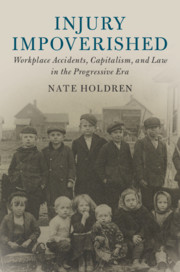Book contents
- Injury Impoverished
- Cambridge Historical Studies in American Law and Society
- Injury Impoverished
- Copyright page
- Epigraph
- Contents
- Tables
- Acknowledgments
- Introduction
- Part I The Eclipse of Recognition and the Rise of the Tyranny of the Table
- 1 Commodification and Recognition within the Tyranny of the Trial
- 2 Injury Impoverished
- 3 Suffering and the Price of Life and Limb
- Interlude
- Part II New Machineries of Injustice
- Conclusion
- Coda
- Index
1 - Commodification and Recognition within the Tyranny of the Trial
from Part I - The Eclipse of Recognition and the Rise of the Tyranny of the Table
Published online by Cambridge University Press: 06 April 2020
- Injury Impoverished
- Cambridge Historical Studies in American Law and Society
- Injury Impoverished
- Copyright page
- Epigraph
- Contents
- Tables
- Acknowledgments
- Introduction
- Part I The Eclipse of Recognition and the Rise of the Tyranny of the Table
- 1 Commodification and Recognition within the Tyranny of the Trial
- 2 Injury Impoverished
- 3 Suffering and the Price of Life and Limb
- Interlude
- Part II New Machineries of Injustice
- Conclusion
- Coda
- Index
Summary
Chapter 1 examines the court-based system of employee injury law that existed in the United States prior to the introduction of workers’ compensation in the 1910s. The purpose of this examination is to set up the rest of the book’s treatment of compensation laws. The chapter discusses the deficits and injustice of that system, but places particular emphasis on how this prior system included a wide range of meanings for injury and ways that injured people could make justice claims. The chapter also draws on philosopher Nancy Fraser’s writing to argue that a full treatment of injury requires us to have a multifaceted concept of justice concerned with issues of inequality and poverty but also respect and human dignity.
Keywords
- Type
- Chapter
- Information
- Injury ImpoverishedWorkplace Accidents, Capitalism, and Law in the Progressive Era, pp. 19 - 52Publisher: Cambridge University PressPrint publication year: 2020

